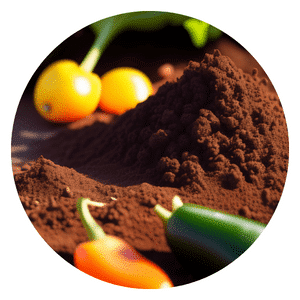The Best Methods to Grow Organic Zucchini
Organic gardening has gained immense popularity in recent years due to its numerous health and environmental benefits.
Among the many vegetables that can be grown organically, zucchini stands out as a versatile and nutritious option.
With its vibrant green color, mild flavor, and ability to thrive in various climates, zucchini has become a staple in gardens around the world.
However, successfully growing this summer squash requires knowledge of the best methods for organic cultivation.
In this article, we will explore tried-and-true techniques to help you grow abundant and healthy organic zucchini in your own backyard.
Zucchini Gardening Methods Menu
Outdoor Garden
Planting zucchini seeds directly in well-draining soil is a crucial step to ensure successful growth.
Zucchini plants thrive in soil that is loose, rich, and well-draining.
By preparing the soil beforehand and enriching it with organic matter like compost or aged manure, you provide the necessary nutrients for the plant’s development. These organic materials help improve soil structure, water retention, and nutrient availability.
To begin planting zucchini seeds, choose a sunny spot in your garden with at least six hours of direct sunlight per day.
The ideal time to sow the seeds is after all chances of frost have passed and when the soil temperature reaches around 60°F (15°C).
Dig a small hole about an inch deep and place two to three seeds inside before covering them with soil.
Space each planting hole about 2-3 feet apart to allow ample room for the zucchini vines to spread as they grow.
Once planted, keep the soil consistently moist but not waterlogged during germination.
As the seedlings emerge and grow their first leaves, thin them out by removing weaker ones so that only one strong plant remains per planting hole.
Mulching around the base of each zucchini plant can help retain moisture while also preventing weeds from growing.
Regularly monitor for pests such as squash bugs or powdery mildew on leaves and treat accordingly using natural methods or organic insecticides if necessary.
Raised Beds
One of the best methods to grow organic zucchini is by using raised beds.
Raised beds offer several advantages that contribute to optimal zucchini growth.
Firstly, they allow for better drainage, preventing waterlogged soil and potential root rot. This is crucial for zucchinis as they prefer well-drained soil and are susceptible to diseases caused by excess moisture.
In addition, raised beds provide a controlled environment where gardeners can easily amend the soil with nutrient-rich compost and organic matter.
Zucchinis thrive in fertile soil, so incorporating compost into the raised beds ensures a steady supply of essential nutrients throughout their growing season.
Moreover, organic matter helps improve the overall structure of the soil, promoting root development and enhancing water retention capacity.
Furthermore, raised beds make weed control more manageable.
By elevating the planting area, it becomes easier to identify and remove weeds promptly before they compete with zucchini plants for nutrients and space.
Additionally, because the planting area is contained within a defined space, gardeners can implement mulching techniques effectively to further suppress weed growth while retaining moisture in the soil.
Overall, utilizing raised beds filled with nutrient-rich soil, compost, and organic matter offers an efficient approach to growing organic zucchini.
The improved drainage prevents water-related issues while providing an opportunity to enhance fertility through amendments like compost.
Furthermore, this method allows for effective weed control strategies such as mulching.
Container Gardening
Zucchini is a popular summer squash that can be easily grown in containers.
When choosing a container for growing zucchini, it is important to select one that is large enough to accommodate the plant’s root system.
A container with a minimum size of 5 gallons is recommended, but larger containers, such as half barrels or planters, are even better as they provide more space for the roots to grow.
To ensure successful growth, it is crucial to use well-draining organic potting mix in the containers. This type of soil will allow excess water to drain away properly and prevent waterlogging, which can lead to root rot and other diseases.
Additionally, adding compost or aged manure to the potting mix will provide essential nutrients for the zucchini plants.
Proper drainage holes are also necessary for container gardening with zucchini.
Without sufficient drainage, excess water can accumulate in the bottom of the container and cause root damage.
It is advisable to have several drainage holes at the bottom of each container and elevate them slightly by placing them on bricks or blocks. This will ensure that water flows freely through the soil and prevents any potential issues caused by standing water.
In conclusion, growing zucchini in large containers filled with well-draining organic potting mix provides an excellent method for cultivating this versatile summer squash organically.
In soil pure and rich, let zucchini rest, Embrace organic ways bestowed by Nature’s crest. With compost and mulch, create a thriving bed, Let worms be our allies, beneath roots they thread. Water gently, don't let parched leaves plead, Sunshine an elixir for growth we seek. Sing to each sprout, the sweetest of songs, And witness abundance where green belongs.
Chappy The Gardener
Vertical Gardening
One of the best methods to grow organic zucchini is through vertical gardening.
By training zucchini plants to grow vertically using trellises or stakes, you can maximize your space and optimize airflow around the plants. This technique not only saves valuable garden real estate but also helps reduce the risk of diseases that commonly affect zucchini plants.
Vertical gardening allows you to make the most out of limited garden space.
Instead of sprawling on the ground, zucchini vines can be trained to climb up trellises or stakes. This not only saves space but also makes harvesting easier as the fruits are more visible and accessible.
Moreover, when grown vertically, zucchini plants receive better exposure to sunlight and improved air circulation, which aids in preventing fungal diseases that thrive in damp conditions.
In addition to saving space and reducing disease risks, vertical gardening offers other benefits for organic zucchini growers.
Growing upwards helps keep pests at bay since many insects find it challenging to navigate climbing structures compared to open ground areas.
Furthermore, by growing zucchinis vertically, you can prevent fruit rot as the fruits are elevated from damp soil surfaces where they could potentially come into contact with pathogens or decay-inducing microorganisms.
Overall, vertical gardening is a highly effective method for growing organic zucchinis due to its space-saving qualities and ability to improve airflow around plants while minimizing disease risks and pest infestations.
Square Foot Gardening
Square foot gardening is a highly efficient and productive method to grow zucchini.
By dividing the garden bed into small sections, each measuring one square foot, you can maximize the use of space and ensure optimal growth for your zucchini plants. This technique allows you to plant one or two zucchini plants per square foot, ensuring that they have enough room to grow without overcrowding each other.
The key advantage of using the square foot gardening technique for growing zucchini is that it helps control the spread of this fast-growing vegetable.
Zucchini plants have a tendency to take over the garden if left unchecked, but by confining them to one square foot per plant, you can easily manage their growth and prevent them from encroaching on other plants. This method also makes it easier to tend to your zucchini plants, as you can access each individual square foot without stepping on the soil or damaging neighboring plants.
In addition to efficient use of space and better control over growth, square foot gardening also offers other benefits for growing organic zucchini.
The close proximity between plants in this technique promotes natural shade and moisture retention in the garden bed, which reduces water requirements and helps deter weed growth.
It also facilitates companion planting by allowing you to plan which vegetables or herbs are planted nearby for mutual benefit or pest control purposes.
With these advantages in mind, utilizing the square foot gardening technique is an excellent choice for anyone looking to grow organic zucchinis successfully.
Intensive Planting
Intensive planting is a technique that allows gardeners to maximize their zucchini yield by increasing the number of plants in a designated area.
By planting the zucchini plants close together, gardeners can make use of every inch of available space and significantly increase their harvest.
However, it is crucial to ensure proper spacing between the plants to allow for adequate air circulation and growth.
When implementing intensive planting with zucchini, it is important to consider the specific requirements of these plants.
Zucchinis are known for their large leaves and sprawling growth habit, so providing enough space for each plant’s expansion is essential.
Adequate airflow between the plants helps prevent diseases such as powdery mildew, which can be detrimental to zucchini production.
To achieve successful intensive planting, gardeners should space each zucchini plant approximately 3-4 feet apart. This distance allows for proper air circulation while still maximizing the number of plants in a given area.
Additionally, regular pruning and training techniques can help keep the plants compact and manageable, further optimizing yields within limited space.
By utilizing intensive planting methods with appropriate spacing considerations, gardeners can enjoy an abundant supply of organic zucchinis while making efficient use of their gardening area.
Companion Planting
Companion planting is a well-known technique in organic gardening that involves growing certain plants together to maximize their benefits.
When it comes to growing zucchini organically, companion plants can play a crucial role.
For instance, radishes are excellent companions for zucchini as they help deter pests like cucumber beetles and squash bugs. These pests are attracted to the scent of radish leaves instead of the zucchini plant itself.
In addition to radishes, marigolds also make great companion plants for zucchini.
Marigolds emit a strong fragrance that repels many common garden pests such as aphids and nematodes. Their bright flowers can also attract beneficial insects like ladybugs and lacewings, which feed on harmful pests.
Furthermore, adding herbs like basil or dill near your zucchini plants not only adds flavor to your dishes but also acts as natural pest deterrents.
Basil has been known to repel flies and mosquitoes while dill attracts beneficial insects such as wasps and parasitic wasps that prey on caterpillars and aphids.
By incorporating these companion plants into your organic zucchini garden, you can create a healthier environment for your crops while reducing the need for chemical pesticides.
Mulching
One of the best methods to grow organic zucchini is by applying organic mulch around the plants.
Mulching provides numerous benefits that contribute to the healthy and abundant growth of zucchini.
Firstly, it helps to retain moisture in the soil, preventing it from drying out too quickly and ensuring that the plants have a consistent water supply. This is particularly important during hot summer months when water evaporation is high.
Another advantage of using organic mulch around zucchini plants is its ability to suppress weeds.
By creating a barrier between the soil surface and sunlight, mulch inhibits weed growth and competition for nutrients with zucchini plants. This not only saves time and effort spent on weed control but also reduces damage caused by weeds competing for essential resources.
Moreover, organic mulch helps to maintain a consistent soil temperature throughout the growing season.
It acts as an insulating layer, protecting the roots from extreme temperature fluctuations or frost during cooler nights. This stability ensures optimal conditions for root development and overall plant health, leading to better yields of delicious zucchinis throughout the growing season.
In conclusion, incorporating organic mulch such as straw, wood chips, or compost around zucchini plants can greatly enhance their growth in an organic garden setting.
The retained moisture, weed suppression properties, and maintenance of consistent soil temperature all contribute towards healthier plants that yield abundant crops of tasty zucchinis.
Organic Pest Control
One of the best methods to grow organic zucchini is by implementing organic pest control techniques.
Instead of relying on chemical pesticides, which can harm the environment and potentially contaminate the zucchini, organic gardeners can opt for more natural methods.
Handpicking insects is a simple yet effective way to control pests in the garden.
By regularly inspecting the zucchini plants and removing any visible pests by hand, such as aphids or caterpillars, you can prevent them from causing significant damage.
In addition to handpicking insects, using insecticidal soaps or neem oil are great alternatives for organic pest control.
Insecticidal soaps work by suffocating soft-bodied insects like mites or aphids when sprayed directly onto them.
Neem oil, derived from the seeds of the neem tree, has both insecticidal and fungicidal properties and is effective against a wide range of pests including whiteflies and spider mites. These natural sprays provide an environmentally-friendly option to keep your zucchini plants free from harmful insects.
Encouraging beneficial insects like ladybugs and lacewings is another crucial aspect of organic pest control in growing zucchini.
Ladybugs are voracious predators that feed on aphids, while lacewings prey on smaller pests like thrips or spider mites.
Attracting these beneficial insects to your garden can be done by planting flowers that provide them with nectar or pollen as alternative food sources when their preferred prey is scarce.
Organic Fertilizers
Using organic fertilizers is one of the best methods to grow healthy and productive zucchini plants organically.
Compost, which is made from decomposed organic matter such as kitchen scraps, leaves, and grass clippings, is a fantastic option.
It not only enriches the soil with essential nutrients but also improves its structure and water-holding capacity.
Well-rotted manure from animals like cows or chickens also provides a rich source of nutrients that can be incorporated into the soil before planting zucchini seeds or transplants.
Another option for providing essential nutrients to zucchini plants throughout the growing season is using organic liquid fertilizers. These can be made by steeping nutrient-rich materials like seaweed, fish emulsion, or compost in water for a period of time.
The resulting liquid fertilizer can then be applied directly to the base of the zucchini plants or sprayed onto their foliage.
Organic liquid fertilizers are quickly absorbed by the plant’s roots and leaves, ensuring efficient nutrient uptake and promoting vigorous growth.
By utilizing organic fertilizers such as compost, well-rotted manure, or organic liquid fertilizers, gardeners can ensure that their zucchini plants receive all the necessary nutrients they need for optimal growth without relying on synthetic chemical fertilizers. This not only promotes healthier plants but also contributes to sustainable gardening practices by reducing chemical inputs in our gardens.
Crop Rotation
Crop rotation is an essential practice in organic gardening, especially when it comes to growing zucchini.
By planting zucchini in different areas of the garden each year, you can effectively prevent the buildup of pests and diseases that are specific to this vegetable. This method works by disrupting the life cycle of these harmful organisms, making it harder for them to establish themselves and cause damage.
Zucchini is particularly susceptible to various pests and diseases such as squash bugs, vine borers, powdery mildew, and bacterial wilt. These problems can quickly spread and devastate an entire crop if not managed properly.
By rotating where you plant your zucchini each year, you reduce the risk of these issues becoming a recurring problem. This technique allows for a healthier environment for your plants as well as improved soil fertility since different crops have varying nutrient requirements.
Overall, practicing crop rotation with zucchini is a proactive approach that promotes long-term sustainability in your garden while minimizing the need for chemical interventions.
It provides numerous benefits such as pest control, disease prevention, and improved soil health.
So next time you plan your garden layout, be sure to rotate your zucchini plants annually to ensure optimal growth and productivity while maintaining the overall health of your garden ecosystem.
In conclusion, there are several effective gardening methods to grow organic zucchini.
Whether you choose container gardening, raised beds, or traditional in-ground planting, it is important to provide the right conditions and care for your zucchini plants.
Remember to use organic fertilizers and pest control methods to keep your garden chemical-free.
Regularly monitor your plants for signs of pests or diseases and take prompt action to prevent any damage.
With proper planning and attention, you can enjoy a bountiful harvest of delicious organic zucchini all season long.
Start implementing these gardening methods today and witness the incredible growth of your zucchini plants!
Click To Grow
Helps Us Grow – Share If You Like
















